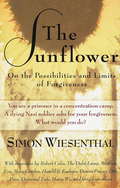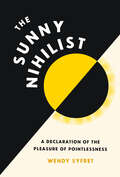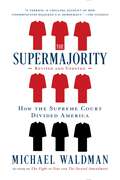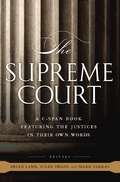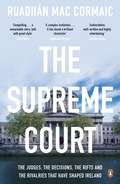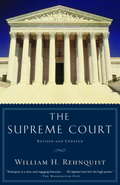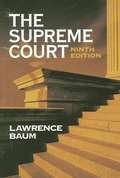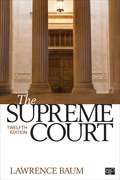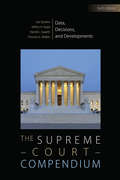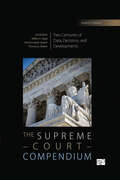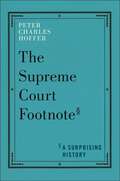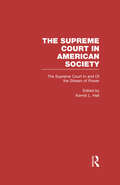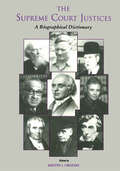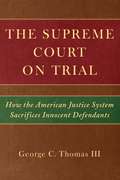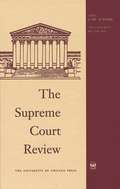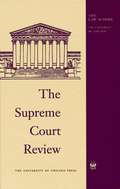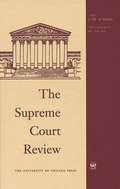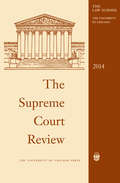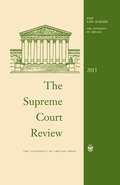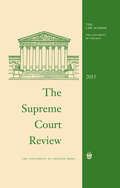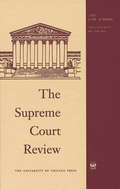- Table View
- List View
The Sunflower: On the Possibilities and Limits of Forgiveness
by Simon WiesenthalWhile imprisoned in a Nazi concentration camp, Simon Wiesenthal was taken one day from his work detail to the bedside of a dying member of the SS. Haunted by the crimes in which he had participated, the soldier wanted to confess to--and obtain absolution from--a Jew. Faced with the choice between compassion and justice, silence and truth, Wiesenthal said nothing. But even years after the way had ended, he wondered: Had he done the right thing? What would you have done in his place?In this important book, fifty-three distinguished men and women respond to Wiesenthal's questions. They are theologians, political leaders, writers, jurists, psychiatrists, human rights activists, Holocaust survivors, and victims of attempted genocides in Bosnia, Cambodia, China and Tibet. Their responses, as varied as their experiences of the world, remind us that Wiesenthal's questions are not limited to events of the past. Often surprising and always thought provoking, The Sunflower will challenge you to define your beliefs about justice, compassion, and human responsibility.From the Trade Paperback edition.
The Sunny Nihilist: A Declaration of the Pleasure of Pointlessness
by Wendy SyfretA positively rebellious take on a traditionally negative philosophy offers an antidote for our anxious times.Career success, a beautiful life, a beautiful Instagram account—what's the point? In a world where meaning has become twisted into a form of currency that everyone is very keen to cash in on, journalist Wendy Syfret invites you to change the way you think about the way you think.In her seminal work, The Sunny Nihilist, Syfret presents the optimism in Nihilism, encouraging us to dismantle our self-care and self-centered way of living and accept a life more or less ordinary. Syfret re-examines the meaning of worth, value, time, happiness, success, and connection, and guides us towards the alternative path of pointless pleasure.When you let go of the idea that everything must have purpose, you will find relief from stress, exhaustion, and anxiety. Most importantly, you can embrace the opportunity to enjoy the moment, the present, the chaos and luck of being alive at all. The Sunny Nihilist is an inspiring call to action and survival adaptation for modern life.
The Supermajority: How the Supreme Court Divided America
by Michael WaldmanA &“terrific, if chilling, account&” (The Guardian) of how the Supreme Court&’s new conservative supermajority is overturning decades of law and leading the country in a dangerous political direction.In The Supermajority, Michael Waldman explores the tumultuous 2021–2022 Supreme Court term. He draws deeply on history to examine other times the Court veered from the popular will, provoking controversy, and backlash. And he analyzes the most important new rulings and their implications for the law and for American society. Waldman asks: What can we do when the Supreme Court challenges the country? Over three days in June 2022, the conservative supermajority overturned the constitutional right to abortion, possibly opening the door to reconsider other major privacy rights, as Justice Clarence Thomas urged. The Court sharply limited the authority of the EPA, reducing the prospects for combatting climate change. It radically loosened curbs on guns amid an epidemic of mass shootings. It fully embraced legal theories such as &“originalism&” that will affect thousands of cases throughout the country. These major decisions—and the next wave to come—will have enormous ramifications for every American. It was the most turbulent term in memory—with the leak of the opinion overturning Roe v. Wade, the first Black woman justice sworn in, and the justices turning on each other in public, Waldman previews the 2022–2023 term and how the brewing fights over the Supreme Court and its role that already have begun to reshape politics. The Supermajority is &“a call to action as much as it is a history of the Supreme Court &“ (Financial Times) at a time when the Court&’s dysfunction—and the demand for reform—are at the center of public debate.
The Supreme Court
by Brian Lamb Susan SwainThe Supreme Court grew out of a unique opportunity to interview all nine sitting Supreme Court Justices plus retired Justice O'Connor for a documentary on the Supreme Court. Through Brian Lamb and Susan Swain's interviews with our country's most influential judges, the book offers portraits of the Justices that introduces readers to the closed world of the Supreme Court, and what's it's really like to serve on the nation's highest Court. Accompanying the Justices around the Supreme Court, and through offices steeped in historic memorabilia, Lamb and Swain offer readers a window into a fascinating world to which few have had access. In these pages, Justice Sotomayor reflects on her first impressions of the job and the acclimation process. Justice Breyer takes us behind the scenes on a private tour of his Chambers as he describes how the Court works. And Chief Justice Roberts talks about the role of the Court in Society, the role of the Chief Justice, and the process of deciding cases. Enriching this unique material are interviews with journalists, court historians, and other experts on the Court. Journalists Joan Biskupic and Lyle Denniston (the longest serving Supreme Court reporter) talk about the process that unfolds in the Court and the impact of a new member of the Court. Clerk of the Supreme Court William Suter provides insights into the traditions of the Court. Historian Jim O'Hara discusses the Supreme Court building and its history. Two attorneys who have argued numerous cases in front of the Supreme Court tell readers what it's like facing the justices in fast paced oral arguments. Vividly illustrated with color photographs, the book is a perfect gift for anyone interested in the makings of this powerful institution.
The Supreme Court
by Ruadhán Mac Cormaic'A wonderful book ... a superb book and it's not just for people interested in law; it tells you a lot about Ireland' Vincent Browne, TV3The judges, the decisions, the rifts and the rivalries - the gripping inside story of the institution that has shaped Ireland.'Combines painstaking research with acute analysis and intelligence' Colm Tóibín, Irish Times' Books of the Year'[Mac Cormaic] has done something unprecedented and done it with a striking maturity, balance and adroitness. He creates the intimacy necessary but never loses sight of the wider contexts; this is not just a book about legal history; it is also about social, political and cultural history ... [the Supreme Court] has found a brilliant chronicler in Ruadhan Mac Cormaic' Diarmaid Ferriter, Professor of Modern Irish History, UCD'Mac Cormaic quite brilliantly tells the story ... balanced, perceptive and fair ... a major contribution to public understanding' Donncha O'Connell, Professor of Law, NUIG, Dublin Review of Books'Compelling ... a remarkable story, told with great style' Irish Times'Authoritative, well-written and highly entertaining' Sunday TimesThe work of the Supreme Court is at the heart of the private and public life of the nation. Whether it's a father trying to overturn his child's adoption, a woman asserting her right to control her fertility, republicans fighting extradition, political activists demanding an equal hearing in the media, women looking to serve on juries, the state attempting to prevent a teenager ending her pregnancy, a couple challenging the tax laws, a gay man fighting his criminalization simply for being gay, a disabled young man and his mother seeking to vindicate his right to an education, the court's decisions can change lives.Now, having had unprecedented access to a vast number of sources, and conducted hundreds of interviews, including with key insiders, award-winning Irish Times journalist Ruadhan Mac Cormaic lifts the veil on the court's hidden world.The Supreme Court reveals new and surprising information about well-known cases. It exposes the sometimes fractious relationship between the court and the government. But above all it tells a story about people - those who brought the cases, those who argued in court, those who dealt with the fallout and, above all, those who took the decisions. Judges' backgrounds and relationships, their politics and temperaments, as well as the internal tensions between them, are vital to understanding how the court works and are explored here in fascinating detail.The Supreme Court is both a riveting read and an important and revealing account of one of the most powerful institutions of our state.Ruadhan Mac Cormaic is the former Legal Affairs Correspondent and Paris Correspondent of the Irish Times. He is now the paper's Foreign Affairs Correspondent.
The Supreme Court
by William H. RehnquistThis new edition of Chief Justice William H. Rehnquist's classic book offers a lively and accessible history of the Supreme Court. His engaging writing illuminates both the high and low points in the Court's history, from Chief Justice Marshall's dominance of the Court during the early nineteenth century through the landmark decisions of the Warren Court. Citing cases such as the Dred Scott decision and Roosevelt's Court-packing plan, Rehnquist makes clear that the Court does not operate in a vacuum, that the justices are unavoidably influenced by their surroundings, and that their decisions have real and lasting impacts on our society. The public often hears little about the Supreme Court until decisions are handed down. Here, Rehnquist reveals its inner workings--the process by which cases are chosen, the nature of the conferences where decisions are made, and the type of debates that take place. With grace and wit, this incisive history gives a dynamic and informative account of the most powerful court in the nation and how it has shaped the direction America has taken.
The Supreme Court (9th edition)
by Lawrence BaumBaum (political science, Ohio State U.) presents a short guide for readers who know a lot or a little about the highest court in the US. No dates are noted for earlier editions; this one reflects new scholarship and developments such as the Bush v. Gore case and its repercussions. Cited in Books for College Libraries, 3d. ed. Annotation ©2004 Book News, Inc., Portland, OR (booknews.com)
The Supreme Court 12th edition
by Lawrence BaumThe book examines each major aspect of the Court: the selection, backgrounds, and departures of justices; the creation of the Court's agenda; the decision-making process and the Court's impact on government and American society.
The Supreme Court Compendium: Data, Decisions, and Developments
by Thomas G. Walker Harold J. Spaeth Lee J. Epstein Professor Jeffrey A. SegalThe Supreme Court Compendium provides historical and statistical information on the Supreme Court: its institutional development; caseload; decision trends; the background, nomination, and voting behavior of its justices; its relationship with public, governmental, and other judicial bodies; and its impact. With over 180 tables and figures, this new edition is intended to capture the full retrospective picture through the 2013-2014 term of the Roberts Court and the momentous decisions handed down within the last four years, including United States v. Windsor, National Federation of Independent Business v. Sebelius, and Shelby County v. Holder.
The Supreme Court Compendium: Data, Decisions, and Developments
by Thomas G. Walker Harold J. Spaeth Lee J. Epstein Professor Jeffrey A. SegalThe Supreme Court Compendium provides historical and statistical information on the Supreme Court: its institutional development; caseload; decision trends; the background, nomination, and voting behavior of its justices; its relationship with public, governmental, and other judicial bodies; and its impact. With over 180 tables and figures, this new edition is intended to capture the full retrospective picture through the 2013-2014 term of the Roberts Court and the momentous decisions handed down within the last four years, including United States v. Windsor, National Federation of Independent Business v. Sebelius, and Shelby County v. Holder.
The Supreme Court Compendium: Two Centuries of Data, Decisions, and Developments
by Thomas G. Walker Lee Epstein Jeffrey A. Segal Harold J. SpaethThe Supreme Court Compendium provides historical and statistical information on the Supreme Court: its institutional development; caseload; decision trends; the background, nomination, and voting behavior of its justices; its relationship with public, governmental, and other judicial bodies; and its impact. With over 180 tables and figures, this new edition is intended to capture the full retrospective picture through the 2013-2014 term of the Roberts Court and the momentous decisions handed down within the last four years, including United States v. Windsor, National Federation of Independent Business v. Sebelius, and Shelby County v. Holder.
The Supreme Court Compendium: Two Centuries of Data, Decisions, and Developments
by Thomas G. Walker Lee Epstein Jeffrey A. Segal Harold J. SpaethThe Supreme Court Compendium provides historical and statistical information on the Supreme Court: its institutional development; caseload; decision trends; the background, nomination, and voting behavior of its justices; its relationship with public, governmental, and other judicial bodies; and its impact. With over 180 tables and figures, this new edition is intended to capture the full retrospective picture through the 2013-2014 term of the Roberts Court and the momentous decisions handed down within the last four years, including United States v. Windsor, National Federation of Independent Business v. Sebelius, and Shelby County v. Holder.
The Supreme Court Footnote: A Surprising History
by Peter Charles HofferA history of the humble footnote and its impact on the highest court in the landIn May 2022, a seismic legal event occurred as the draft majority opinion in Dobbs v. Jackson Women’s Health was leaked. The majority aimed to eliminate constitutional protection for abortion. Amidst the fervor, an unnoticed detail emerged: over 140 footnotes accompanied the majority opinion and dissent. These unassuming annotations held immense significance, unveiling justices’ beliefs about the Constitution’s essence, highlighting their controversial reasoning, and laying bare the vastly different interpretations of the role of Supreme Court Justice.The Supreme Court Footnote offers a study of the evolution of footnotes in US Supreme Court opinions and how they add to our constitutional understanding. Through a comprehensive analysis, Peter Charles Hoffer argues that as justices alter the course of history via their decisions, they import their own understandings of it through the footnotes. The book showcases how the role of the footnote within Supreme Court opinions has evolved, beginning with one of the first cases in the history of the court, Chisholm v. Georgia in 1792 (a case concerning federalism vs. states’ rights) and ending with the landmark Dobbs v. Jackson case in 2022. Along the way, Hoffer demonstrates how the footnotes within these decisions reflect the changing role of the Supreme Court Justice, along with how interpretations of the constitution have transformed over time.At once surprising and revealing, The Supreme Court Footnote proves that what appears below the line is not only a unique window into the history of constitutional law but also a source of insight as to how the court will act going forward.
The Supreme Court In and Out of the Stream of History: The Supreme Court in American Society
by Kermit L. HallAvailable as a single volume or part of the 10 volume set Supreme Court in American Society
The Supreme Court Justices: A Biographical Dictionary (Abc-clio Supreme Court Handbooks Ser.)
by Melvin UrofskyFirst published in 1994. Routledge is an imprint of Taylor & Francis, an informa company.
The Supreme Court On Trial: How the American Justice System Sacrifices Innocent Defendants
by George C. Thomas IIIThe chief mandate of the criminal justice system is not to prosecute the guilty but to safeguard the innocent from wrongful convictions; with this startling assertion, legal scholar George Thomas launches his critique of the U. S. system and its emphasis on procedure at the expense of true justice. Thomas traces the history of jury trials, an important component of the U. S. justice system, since the American Founding. In the mid-twentieth century, when it became evident that racism and other forms of discrimination were corrupting the system, the Warren Court established procedure as the most important element of criminal justice. As a result, police, prosecutors, and judges have become more concerned about following rules than about ensuring that the defendant is indeed guilty as charged. Recent cases of prisoners convicted of crimes they didn't commit demonstrate that such procedural justice cannot substitute for substantive justice. American justices, Thomas concludes, should take a lesson from the French, who have instituted, among other measures, the creation of an independent court to review claims of innocence based on new evidence. Similar reforms in the United States would better enable the criminal justice system to fulfill its moral and legal obligation to prevent wrongful convictions. George C. Thomas III is Professor of Law and Judge Alexander P. Waugh, Sr. , Distinguished Scholar at Rutgers School of Law. "Thomas draws on his extensive knowledge of the field to elaborate his elegant and important thesis---that the American system of justice has lost sight of what ought to be its central purpose---protection of the innocent. " ---Susan Bandes, Distinguished Research Professor of Law, DePaul University College of Law "Thomas explores how America's adversary system evolved into one obsessed with procedure for its own sake or in the cause of restraining government power, giving short shrift to getting only the right guy. His stunning, thought-provoking, and unexpected recommendations should be of interest to every citizen who cares about justice. " ---Andrew E. Taslitz, Professor of Law, Howard University School of Law "An unflinching, insightful, and powerful critique of American criminal justice---and its deficiencies. George Thomas demonstrates once again why he is one of the nation's leading criminal procedure scholars. His knowledge of criminal law history and comparative criminal law is most impressive. " ---Yale Kamisar, Distinguished Professor of Law, University of San Diego and Clarence Darrow Distinguished University Professor Emeritus of Law, University of Michigan
The Supreme Court Review 2011
by The University of Chicago PressFor fifty years, The Supreme Court Review has been lauded for providing authoritative discussion of the Court's most significant decisions. The Review is an in-depth annual critique of the Supreme Court and its work, keeping up on the forefront of the origins, reforms, and interpretations of American law. Recent volumes have considered such issues as post-9/11 security, the 2000 presidential election, cross burning, federalism and state sovereignty, failed Supreme Court nominations, and numerous First and Fourth amendment cases.
The Supreme Court Review, 2011 (Supreme Court Review)
by The University of Chicago PressFor fifty years, The Supreme Court Review has been lauded for providing authoritative discussion of the Court’s most significant decisions. The Review is an in-depth annual critique of the Supreme Court and its work, keeping up on the forefront of the origins, reforms, and interpretations of American law. Recent volumes have considered such issues as post-9/11 security, the 2000 presidential election, cross burning, federalism and state sovereignty, failed Supreme Court nominations, and numerous First and Fourth amendment cases.
The Supreme Court Review, 2012 (Supreme Court Review)
by The University of Chicago PressFor fifty years, The Supreme Court Review has been lauded for providing authoritative discussion of the court's most significant decisions. The Review is an in-depth annual critique of the Supreme Court and its work, keeping up on the forefront of the origins, reforms, and interpretations of American law. Recent volumes have considered such issues as post-9/11 security, the 2000 presidential election, cross-burning, federalism and state sovereignty, failed Supreme Court nominations, and numerous First- and Fourth-Amendment cases.
The Supreme Court Review, 2013
by Dennis J. Hutchinson Geoffrey E. Stone David A. StraussFor fifty years, The Supreme Court Review has been lauded for providing authoritative discussion of the Court's most significant decisions. The Review is an in-depth annual critique of the Supreme Court and its work, keeping up on the forefront of the origins, reforms, and interpretations of American law. Recent volumes have considered such issues as post-9/11 security, the 2000 presidential election, cross burning, federalism and state sovereignty, failed Supreme Court nominations, the battles concerning same-sex marriage, and numerous First and Fourth amendment cases.
The Supreme Court Review, 2013 (Supreme Court Review)
by The University of Chicago PressFor fifty years, The Supreme Court Review has been lauded for providing authoritative discussion of the Court's most significant decisions. The Review is an in-depth annual critique of the Supreme Court and its work, keeping up on the forefront of the origins, reforms, and interpretations of American law. Recent volumes have considered such issues as post-9/11 security, the 2000 presidential election, cross burning, federalism and state sovereignty, failed Supreme Court nominations, the battles concerning same-sex marriage, and numerous First and Fourth amendment cases.
The Supreme Court Review, 2014 (Supreme Court Review)
by The University of Chicago PressFor more than fifty years, The Supreme Court Review has been lauded for providing authoritative discussion of the Court's most significant decisions. An in-depth annual critique of the Supreme Court and its work, The Supreme Court Review keeps at the forefront of the reforms and interpretations of American law. Recent volumes have considered such issues as post-9/11 security, the 2000 presidential election, cross burning, federalism and state sovereignty, failed Supreme Court nominations, the battles concerning same-sex marriage, and numerous First and Fourth Amendment cases.
The Supreme Court Review, 2015 (Supreme Court Review)
by The University of Chicago PressFor more than fifty years, The Supreme Court Review has won acclaim for providing a sustained and authoritative survey of the implications of the Court's most significant decisions. The Supreme Court Review is an in-depth annual critique of the Supreme Court and its work, keeping up on the forefront of the origins, reforms, and interpretations of American law. It is written by and for legal academics, judges, political scientists, journalists, historians, economists, policy planners, and sociologists.
The Supreme Court Review, 2016 (Supreme Court Review)
by The University of Chicago PressFor more than fifty years, The Supreme Court Review has won acclaim for providing a sustained and authoritative survey of the implications of the Court’s most significant decisions. The Supreme Court Review is an in-depth annual critique of the Supreme Court and its work, keeping up on the forefront of the origins, reforms, and interpretations of American law. It is written by and for legal academics, judges, political scientists, journalists, historians, economists, policy planners, and sociologists.
The Supreme Court Review, 2017 (Supreme Court Review)
by The University of Chicago PressSince it first appeared in 1960, The Supreme Court Review (SCR) has won acclaim for providing a sustained and authoritative survey of the implications of the Court's most significant decisions. SCR is an in-depth annual critique of the Supreme Court and its work, keeping up on the forefront of the origins, reforms, and interpretations of American law. SCR is written by and for legal academics, judges, political scientists, journalists, historians, economists, policy planners, and sociologists.
